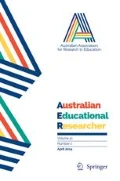Abstract
Schools are often the first point of contact for young refugees resettling in Australia and play a significant role in establishing meaningful connections to Australian society and a sense of belonging in Australia (Olliff in Settling in: How do refugee young people fair within Australia’s settlement system? Centre for Multicultural Youth Issues, Melbourne. http//:www.cmyi.net.au/ResearchandPolicy. Accessed 21 June 2010, 2007; Gifford et al. in: Good Starts for recently arrived youth with refugee backgrounds: Promoting wellbeing in the first three years of settlement in Melbourne, Australia. Melbourne: La Trobe Refugee Research Centre. http://www.latrobe.edu.au/larrc/documents-larrc/reports/report-good-starts.pdf. Accessed 4 June 2011, 2009; Sidhu and Taylor in: Educational provision for refugee youth in Australia: Left to chance? Journal of Sociology, 43(3), 283–300, 2007). However, too little is known of how refugee youth encounter school in their new country. This article draws upon individual narratives of young former refugee’s experiences of high schools. It explores the stories told by the young people of being identified as different and of negotiating ways of belonging in schools both academically and socially. It argues that it is how the school positions the newly arrived refugee students within mainstream school culture that opens up or restricts opportunities for inclusion in all aspects of school (in culture and pedagogy).
Similar content being viewed by others
References
Ang, I., & St Louis, B. (2005). Guest editorial: The predicament of difference. Ethnicities, 5(3), 291–304.
Atencio, M. (2006) ‘Crunk’, ‘cracking’ and ‘choreographies’ [manuscript]: the place and meaning of health and physical activity in the lives of young people from culturally diverse urban neighbourhoods, PhD thesis, University of Wollongong.
Cassity, E., & Gow, G. (2005). Making up for lost time: The experiences of Southern Sudanese young refugees in high schools (programs and practice). Youth Studies Australia, 24(3), 51–56.
Christie, P. & Sidhu, R. (2002) Responding to globalisation: Refugees and the challenges facing Australian schools. http://www.arts.uwa.edu.au/MotsPluriels/MP2102pcrs.html. Accessed 10 May 2011.
Department of Immigration and Citizenship (2011) Australia’s Humanitarian Program Information Paper 2011. http://www.immi.gov.au/media/publications/pdf/hp-client-info-paper.pdf. Accessed 5 Jan 2012.
Ferfolja, T. (2009). The refugee action support program: Developing understandings of diversity. Teaching Education, 20(4), 395–407.
Ferfolja, T., & Vickers, M. (2010). Supporting refugee students in school education in Greater Western Sydney. Critical Studies in Education, 51(2), 149–162.
Foubister, C., & Badroodien, A. (2012). African Migrant Youth, Schooling, and Social Class in Cape Town. In L. Weis & N. Dolby (Eds.), Social Class and Education: Global Perspectives (pp. 124–139). London: Routledge.
Gifford, S.M. Correa-Velez, I and Sampson R. (2009) Good Starts for recently arrived youth with refugee backgrounds: Promoting wellbeing in the first three years of settlement in Melbourne, Australia. Melbourne: La Trobe Refugee Research Centre. http://www.latrobe.edu.au/larrc/documents-larrc/reports/report-good-starts.pdf. Accessed 4 June 2011.
Hattam, R., & Every, D. (2010). Teaching in fractured classrooms: Refugee education, public culture, community and ethics. Race Ethnicity and Education, 13(4), 409–424.
Hewson, S. (2006) Inside out. Boys’ voices: Identity and refugee students in a secondary school. In K. Cadman & K. O’Regan (eds.), Tales out of school: Identity and English language teaching. (pp. 34–48). Flinders Park, SA: Australian Council of TESOL Associations.
Keddie, A. (2011a). Supporting minority students through a reflexive approach to empowerment. British Journal of Sociology of Education, 32(2), 221–238.
Keddie, A. (2011b). Pursuing justice for refugee students: Addressing issues of cultural (mis)recognition. International Journal of Inclusive Education, 15(1), 1–16.
Mansouri, F. Jenkins, L. Morgan, L. Taouk, M. (2009). The impact of racism upon the health and wellbeing of young Australians. The Foundation for Young Australians, the Institute for Citizenship and Globalisation (Deakin University). http://www.fya.org.au/wp-content/uploads/2010/05/Impact_of_Racism_FYA_report.pdf. Accessed 10 Aug 2012.
Matthews, J. (2008). Schooling and settlement: Refugee education in Australia. International Studies in the Sociology of Education, 18(1), 31–45.
Miller, J. M. (2003). Audible difference: ESL and social identity in schools. Clevedon, UK: Multilingual Matters.
Miller, J. M. (2005). Identity and language use: The politics of speaking ESL in schools. In A. Pavlenko & A. Blackledge (eds.), Negotiation of identity in multilingual contexts (pp. 290–315), Clevedon, UK: Multilingual Matters.
Miller, J., Mitchell, J., & Brown, J. (2005). African refugees with interrupted schooling in the high school mainstream: Dilemmas for teachers. Prospect, 20(2), 19–33.
Naidoo, L. (2011). What works? AA program of best practice for supporting the literacy needs of refugee high school students. Literacy Learning: the Middle Years, 19(1), 29–38.
Olliff, L (2007) Settling in: How do refugee young people fair within Australia’s settlement system? Centre for Multicultural Youth Issues, Melbourne. http//:www.cmyi.net.au/ResearchandPolicy. Accessed 21 June 2010.
Rassool, N. (1999). Flexible identities: Exploring race and gender issues among a group of immigrant pupils in an inner-city comprehensive school. British Journal of Sociology of Education, 20(1), 23–36.
Refugee Council of Australia (2009) Amplifying the Voices of Young Refugees. http//:www.rcoa.org.au. Accessed 12 Dec 2010.
Riggs, D., & Due, C. (2010). Friendship, exclusion and power: A study of two South Australian schools with new arrivals programs. Australasian Journal of Early Childhood, 35(4), 73–80.
Sidhu, R., & Taylor, S. (2007). Educational provision for refugee youth in Australia: Left to chance? Journal of Sociology, 43(3), 283–300.
Wyn, J. (2007). Learning to become somebody well: Challenges for educational policy. Australian Educational Researcher, 34(3), 35–52.
Youdell, D. (2006). Diversity, inequality, and a post-structural politics for education. Discourse: studies in the cultural politics of education, 27(1), 33–42.
Youdell, D. (2011). School trouble: Identity, power and politics in education. London: Routledge.
Author information
Authors and Affiliations
Corresponding author
Rights and permissions
About this article
Cite this article
Uptin, J., Wright, J. & Harwood, V. ‘It felt like i was a black dot on white paper’: examining young former refugees’ experience of entering Australian high schools. Aust. Educ. Res. 40, 125–137 (2013). https://doi.org/10.1007/s13384-012-0082-8
Received:
Accepted:
Published:
Issue Date:
DOI: https://doi.org/10.1007/s13384-012-0082-8




